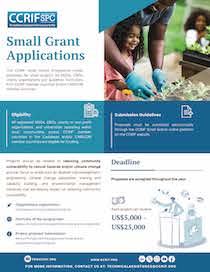In early August 2016 a tropical storm formed in the central Caribbean and evolved into a category 1 hurricane named Earl on 3 August. The storm moved to the west increasing strength just before impacting the northern Central America region, bringing tropical cyclone force winds and storm surge to Belize and Honduras on 4 August as well as heavy rainfall over Guatemala, Honduras, Belize and Mexico.
A magnitude 6.1 Earthquake occurred at 03:25:22 UTC on 10 June 2016, (21:25:22 9 June local time), at 17 km (10.6 mi) E of Puerto Morazan, Nicaragua, 25 km (15.5 mi) NE of El Viejo, Nicaragua, 25 km (15.5 mi) SSW of Somotillo, Nicaragua, 26 km (16.2 mi) NNE of Chinandega, Nicaragua and 114 km (71 mi) NW of Managua, Nicaragua´s capital city. Initial estimates from the United States Geological Survey (USGS) locates the epicentre of the event at 12.841° N, 87.013°W, and at a depth of 10.0 km (6.2 mi).
A magnitude 5.1 Earthquake occurred at 03:28:06 UTC on 10 June 2016, (21:28:06 on 9 June local time), at 24 km (14.9 mi) S of Somotillo, Nicaragua, 30 km (18.6 mi) NNE of Chichigalpa, Nicaragua, 32 km (19.9 mi) NE of Chinandega, Nicaragua, 33 km (20.5 mi) ENE of El Viejo, Nicaragua and 104 km (64.6 mi) NW of Managua, Nicaragua´s capital city. Initial estimates from the United States Geological Survey (USGS) located the epicentre of the event at 12.826° N, 86.903°W, and at a depth of 10.0 km (6.2 mi).
A magnitude 5.8 earthquake occurred at 10:51:31 UTC (6:51:31 local time) on 20 April 2016, at 389 km (241.7 mi) E of Bathsheba, Barbados, 400 km (248.5 mi) E of Bridgetown, Barbados, 552 km (343 mi) E of Bisee, Saint Lucia and 556 km (345.5 mi) E of Castries, Saint Lucia.
According to the United States Geological Survey (USGS) a magnitude 5.2 earthquake occurred at 12:22:21 UTC (8:22:21 local time) on 7 April 2016 at 5 km (3.1 mi) SSW of Irapa, Venezuela, 33 km (20.5 mi) W of Gueiria, Venezuela, 73 km (45.4 mi) ESE of Carupano, Venezuela and 119 km (73.9 mi) W of Port-of-Spain, Trinidad and Tobago.
A magnitude 6.0 Earthquake occurred at 11:26:34 UTC (07:26:34 local time) on 19 March 2016, 124 km (77 mi) ENE of Codrington, Barbuda, 155 km (96 mi) NE of Saint John’s, Antigua and Barbuda, 195 km (121 mi) NNE of Le Moule, Guadeloupe and 201 km (125 mi) NNE of Saint-Francois, Guadeloupe. Initial estimates from the United States Geological Survey (USGS) located the epicentre of the event at 17.991° N, 60.700° W and at a depth of 32 km (19.9 mi).
The Caribbean Rainfall Model (operated by Kinetic Analysis Corporation (KAC)) indicated that a Covered Area Rainfall Event (CARE) was generated in Haiti on 26 February 2016.
The Caribbean Rainfall Model (operated by Kinetic Analysis Corporation (KAC)) indicated that a Covered Area Rainfall Event (CARE) was generated in Haiti on 23 January 2016.
A magnitude 5.0 earthquake occurred at 14:33:00 UTC (10:33:00 local time) on 5 January 2016, 62 km (38 mi) NW of Port of Spain, Trinidad, 81 km (50 mi) NW of Arima, Trinidad, 120 km (74 mi) W of Scarborough, Tobago and 103 km (63 mi) S of St. George’s, Grenada. Initial estimates from the Seismic Research Centre of The University of the West Indies located the epicentre of the event at 11.12° N, 61.83°W, and at a depth of 33 km (20 mi).





